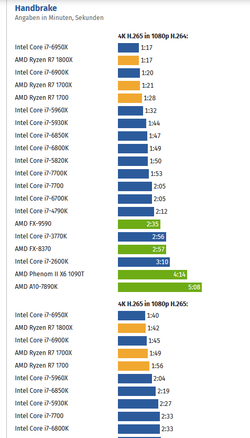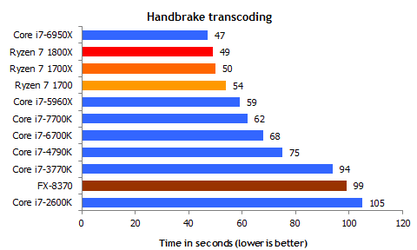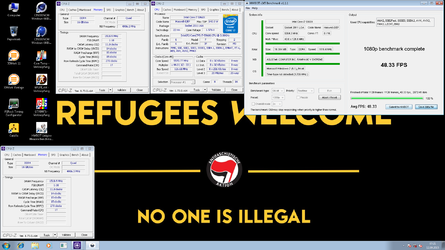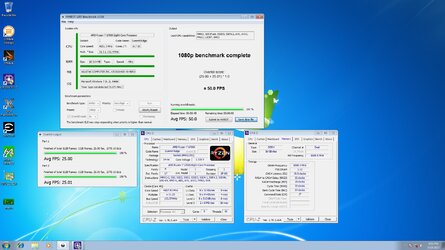- Joined
- Dec 19, 2012
-
Welcome to Overclockers Forums! Join us to reply in threads, receive reduced ads, and to customize your site experience!
You are using an out of date browser. It may not display this or other websites correctly.
You should upgrade or use an alternative browser.
You should upgrade or use an alternative browser.
Why isn't Ryzen faster for encoding video?
- Thread starter JeremyCT
- Start date
- Thread Starter
- #23
Very relevant. Instruction sets also relevant.
But is HandBrake the tell all of processing power? Just wondering.....
No, it isn't really. But I'm less concerned with benchmark numbers and measures of "processing power" than I am with how much time it takes to encode or re-encode a movie. Handbrake is one of the most used tools for performing that task, so to me it's a valid measuring stick for that particular aspect of real world processor performance. It's a task I perform pretty regularly, so it has importance to me. Given the apparently very solid IPC of the new architecture, I have hope that AMD can improve in this realm as time moves forward and the architecture and process mature a bit.
- Joined
- Apr 19, 2012
Depends how you look at this. Your comparing Top Ryzen to top Intel. And it's ok really. So at release with no "optimizations" your getting a 14% gain with the top R71800. You don't "have" to buy the 500$ model the 329$ model will do just the same.
So me sitting here, would compare my 1700 (non x) Ryzen to the top Intel chip and see a 14% gain at a lesser dollar amount.....
You will see a few bios updates. This should improve some things like memory frequency. Then we could even see some newer steppings later down the road that will bring better performance and higher (hopefully) clock speeds and memory speeds. And of course Software optimizations if there are any.
So me sitting here, would compare my 1700 (non x) Ryzen to the top Intel chip and see a 14% gain at a lesser dollar amount.....
You will see a few bios updates. This should improve some things like memory frequency. Then we could even see some newer steppings later down the road that will bring better performance and higher (hopefully) clock speeds and memory speeds. And of course Software optimizations if there are any.
No, it isn't really. But I'm less concerned with benchmark numbers and measures of "processing power" than I am with how much time it takes to encode or re-encode a movie. Handbrake is one of the most used tools for performing that task, so to me it's a valid measuring stick for that particular aspect of real world processor performance. It's a task I perform pretty regularly, so it has importance to me. Given the apparently very solid IPC of the new architecture, I have hope that AMD can improve in this realm as time moves forward and the architecture and process mature a bit.
You will have to wait for the next generation of AMD, just like Bulldozer Family wait and see.
Alaric
New Member
- Joined
- Dec 4, 2011
- Location
- Satan's Colon, US
I think software optimization will play a big role in Ryzen's future performance. Just about everything for several years has been designed to work best with Intel chips. I don't think anyone in 2015 said "Well, AMD is releasing a 250 watt octo core FX, better start optimizing for Bulldozer". I think the FX stuck around longer than a lot of people anticipated a couple years after its release. I think Ryzen has the potential to be a lot bigger deal than it is now. And it's a pretty big deal now.
In the past whenever AMD comes out with a new processor that does not do better than Intel folks always say lets wait for software optimization, then after years of waiting it never bares fruit. The way I look at it AMD comes in second place for most of the years and I don't see that changing in the far future.
Last edited:
- Joined
- Jan 14, 2011
In the past when ever AMD comes out with a new processor that does not do better than Intel folks always say lets wait for software optimization, then after years of waiting it never bares fruit. The way I look at it AMD comes in second place for most of the years and I don't see that changing in the far future.
this, exactly this. same was said with FX "well if they just rewrite their software to work with it" nuh they arent gonna do it. how about make a chip that works with the softwares that are not benches.
also with stuff like handbrake you have to watch and see what kind of disk usage is going on could be a sata bottleneck or something who knows.
- Joined
- Aug 16, 2009
With Video encoding ...... I do allot and use BDRebuilder (X264) there are allot of variables..... one of the biggest is as just mentioned hard drive usage but even more so how many hard drives. By that I mean if you are using the same hard drive to read your video file as the hard drive you are doing the work on it will slow you down considerably, same if you are reading your video source directly from a optical drive ....... major slowdown.
I can't compare RYZEN yet to the rigs I have now but soon, my build is in the works. I can say this ....... its only a 30 min difference between my I7 4770K compared to my FX 8370 for encode times to complete the same file. I had thought it would have been bigger, sometimes our expectations can get the better of us.
I can't compare RYZEN yet to the rigs I have now but soon, my build is in the works. I can say this ....... its only a 30 min difference between my I7 4770K compared to my FX 8370 for encode times to complete the same file. I had thought it would have been bigger, sometimes our expectations can get the better of us.
- Joined
- Dec 19, 2000
Looks like there was a copying misalignment for the H264LQ numbers, where the 1800X did come on top of tha bunch, and I've also added the lower Ryzen models for a broader picture.
1800X: 1345
7700K: 1327
1700X: 1296
1700: 1213
7600K: 970
I'm not familiar with video coding software in general. In other testing I've done, Ryzen is weak in AVX, to the tune of about half IPC relative to Intel. This was a design choice by AMD. If AVX instructions were used, it would not be a strong area for AMD.
The 6900K was also omitted and I think that's an important data point. The fact that the 8 core Intel chip isn't a lot faster suggests to me that Handbrake is not really scaling that well with more cores. Even at lower clock speed the 8 core processor should be much faster than the 7700K, and yet it's barely faster. In fact in the HEVC test it's almost identical, despite having twice the cores.
There must be some other bottleneck like storage read/write speed, or Handbrake is not optimized for larger numbers of cores at all. The problem doesn't seem specific to Ryzen, but rather to processors with more cores.
- Joined
- Dec 19, 2000
In the past whenever AMD comes out with a new processor that does not do better than Intel folks always say lets wait for software optimization, then after years of waiting it never bares fruit. The way I look at it AMD comes in second place for most of the years and I don't see that changing in the far future.
That's probably true. AMD just doesn't have the resources of Intel. However, I think this is a lot different than with the Construction Machinery cores. When Bulldozer came out it was clearly a complete dud. It was barely faster than Phenom II, in some cases actually slower. Meanwhile, while offering much worse performance it used tons more power than Intel. It was actually a pretty embarrassing release.
Ryzen meanwhile is pretty power efficient. It's only a little behind in IPC. It's biggest issue is mostly that it tops out at 4 GHz max, whereas Intel tops out around 5.1 or 5.2 GHz. But even that's more important vs the unlocked Intel processors, as the locked ones just leave that extra headroom on the table.
So at least now AMD is back to being a solid #2, whereas with Bulldozer it was more like they failed to even complete the race.
So I'll have to double check this information but I believe I'm somewhere around the mark. Could be very wrong.
Intel SMT allows for FP calls and simultaneous execution
AMD SMT allows for PF calls but out of order execution (meaning a real core would go first than the SMT, continue cycle).
I'm busy at work today so I don't have too much time to dive into that research. But it could show as to why there is a gain in AMD (due to higher cores) but Intel stays close because of micro-architecture.
Intel SMT allows for FP calls and simultaneous execution
AMD SMT allows for PF calls but out of order execution (meaning a real core would go first than the SMT, continue cycle).
I'm busy at work today so I don't have too much time to dive into that research. But it could show as to why there is a gain in AMD (due to higher cores) but Intel stays close because of micro-architecture.
- Thread Starter
- #33
The encouraging thing to me with AMD's current architecture is that it doesn't rely on special instruction sets to work well. This isn't like 3DNOW all over or AMD64 just hitting the streets. Similar I suppose, but not the same. It seems that coding to take advantage of Ryzen's strengths might be fairly straightforward.
Its success will likely be largely determined by how well AMD gets the tools into the hands of developers to do so. It's a bit of chicken and egg. The processor needs to sell for developers to take the time, but developers won't take the time if there isn't a decently sized install base to serve. AMD will have to hold their collective hands and help out wherever possible here in the beginning to get things going. Getting major game engines such as Unreal4 and Frostbite optimized for Ryzen would certainly help.
Its success will likely be largely determined by how well AMD gets the tools into the hands of developers to do so. It's a bit of chicken and egg. The processor needs to sell for developers to take the time, but developers won't take the time if there isn't a decently sized install base to serve. AMD will have to hold their collective hands and help out wherever possible here in the beginning to get things going. Getting major game engines such as Unreal4 and Frostbite optimized for Ryzen would certainly help.
Last edited:
Late to the party, but I'll give my input anyway. I would ignore Anandtech's encoding results, they are an outlier compared to the rest of the reviewers. Handbrake scales very well with cores and as someone mentioned, the fact that the 6900k isn't much faster in their tests should be a clue that something's not right. I think, based upon their HQ, LQ test titles that they are using a very outdated version of Handbrake (for comparison with prior cpu tests I'm guessing). The HQ, LQ tags were presets in old versions of handbrake but no longer appear in the latest version. If you look at other reviewers, you'll get a much different view.


credit: computebase.de and techreport.com


credit: computebase.de and techreport.com
Similar threads
- Replies
- 11
- Views
- 6K

